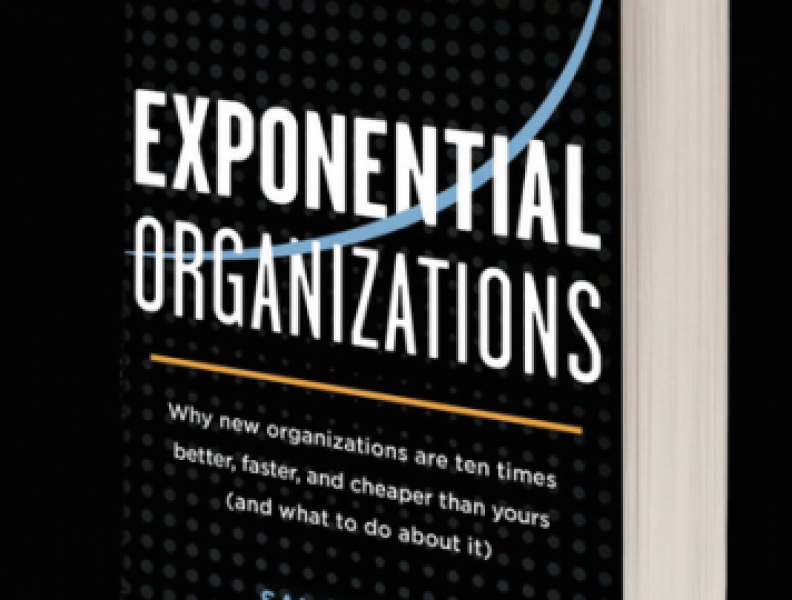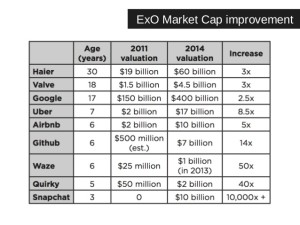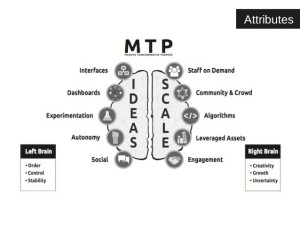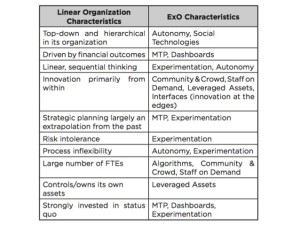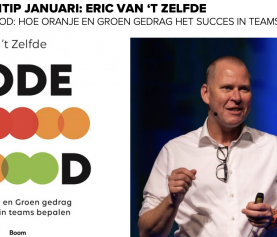Exponential Organizations, an eye opener (book review)
Must-Read Book Review | Exponential Organizations | Patrick Davidson
I can fully recommand you to read this pageturner. To summarise the book in three sentences: Ismail, Van Geest and Malone describe a transformation in business that hasn’t been seen in the last hundred years. They claim the future will be owned by this new breed of Exponential Organizations. To do so they interviewed about 70 visionaries, thinkers and entrepreneurs, performed their own research on 100 startups, and use the kernel of the most important books on innovations in the last decades.
A book like that needs to be read. More importantly, much of the thinking could and should be applied by business leaders and their teams. It provides additional evidence for some of our beliefs at betterday:
Need for Speed
Accelerating is a key capability for each organisation. The average lifetime of a business used to be 45 years in 1955 whereas it is only 15 years nowadays. Product lifecycle have been shortened (The Shark Fin replacing the Bell Curve) and many companies are dependent on the products and services that did not exist five years ago. The classical, linear way of thinking will no longer be sufficient in an ever-changing world.
The need to develop new ways of Collaborating
In order to stay competitive companies need to reinvent themselves. This requires a different approach to how we run business and projects. Experimenting, learning and realising instead of Planning, controlling and reporting. Having people work on challenges they desire to work on, with modern age principles like Boost (90 Days) and Scrum. In the book Exponential Organizations the authors introduce the Massive Transformative Purpose which inspires people to invent solutions that make a difference.
Need to Innovate, continuously
Cases like Airbnb, Uber, Github and Facebook show that to be successful nowadays you no longer need to own assets. ExO’s don’t own assets but they have staff running online platforms, communities and data. This means each organisation need to determine its added value and how it’s going to capture part of the value they create.
So, what’s an ExO?
An Exponential Organization (ExO) is one whose impact (or output) is disproportionally large — at least 10x larger — compared to its peers because of the use of new organizational techniques that leverage exponential technologies.
The birth of the ExO has revolutionized how a company can accelerate its growth by using technology. An ExO can eliminate the incremental, linear way traditional companies get bigger, leveraging assets like community, big data, algorithms, and new technology into achieving performance benchmarks ten times better than its peers. This means a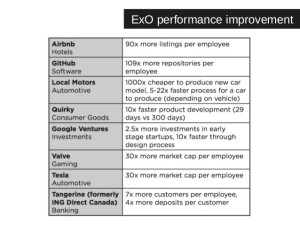 n Exponential Organization (ExO) does not own any assets but its key resources are personel(Staff on Demand), customer (community and crowd) an online platform and data (Algorithms).
n Exponential Organization (ExO) does not own any assets but its key resources are personel(Staff on Demand), customer (community and crowd) an online platform and data (Algorithms).
This enables an ExO to keep the costs low while in the meantime they’re ready to scale up when needed. In other words flexibility to the max and an almost perfect base for profitability. So that’s why an ExO does not aim for possession but is all about access. Value is created by its customers, for its customers, like in the case of Waze. This means that ExOs can grow faster and can realise performances that are ten times better. Instead of ten percent better.
Quotes to remember
“Every company designed to be successful in the 20th century, is doomed to fail in the twenty-first century.” David S Rose.
“Our organizations are designed to resist external changes, instead of embracing them where useful.” John Hagel.
“Exponential organizations are an extension of a trend that started 10.000 years ago, called specialization: focus only on the areas in which you excel” Ismail and others.
“Culture eats Strategy for Breakfast” Joi Ito.
“Knowledge gives you an edge but experimenting is the equivalent of 1000 IQ points” Nassim Taleb.
Key questions that the book answers:
- What’s the definition of an ExO?
- What are the inspiring examples of ExOs? http://bit.ly/1cTgOCV
- How can you build an ExO startup yourself, with these principles?
- So how could you apply the ExO principles to a mid-market company?
- How can you retrofit these ideas into large organizations?
Key questions that remain unanswered in my opinion:
- What’s the difference in behavior – on a day-to-day basis – between leaders of ExOs and more classical organisations?
- How to apply this thinking in day-to-day practice, without depending too much on technology, in order to develop and/or change behavior. Thereby providing individuals and teams with all the ingredients needed to perform.
And now?
Enjoy reading it! Here’s a link to the English version and a link to the Dutch translation
Ismail, Van Geest and Malone describe a transformation in business that hasn’t been seen in the last hundred years.
Having read and re-read the book I can fully recommend it to anyone who is interested in the near future. It’s mind-blowing and sometimes you will feel overpowered.
I think it would be good if universities would encourage their students to study the new models as described in this ground-breaking book about new ways of setting up & running a business as well as new ways of collaborating. In the book they explain the characteristics of a new and revolutionary type of organizations, i.e. the so-called Exponential Organizations (ExOs).

